Escazú (canton)
Escazú is the second canton in the province of San José in Costa Rica. The canton covers an area of 34.49 km².[2] The canton lies west of the San José Canton and its whole territory is part of the Greater Metropolitan Area. According to 2011 census data, its population is 56,509.[3]
Escazú | |
|---|---|
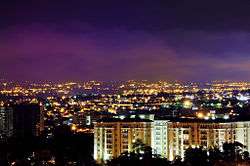 | |
 Flag 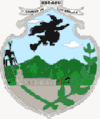 Coat of arms | |
| Etymology: From Saint Miguel Escazu | |
| Nickname(s): Ciudad de las Brujas | |
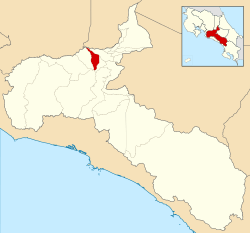 | |
| Country | Costa Rica |
| Province | San José |
| Capital | Escazú Centro |
| Districts | 3 districts |
| Founded | December 7, 1848 |
| Government | |
| • Type | Municipality |
| • Mayor | Arnoldo Barahona (YPE) |
| Area | |
| • Total | 34.49 km2 (13.32 sq mi) |
| Elevation | 1,200 m (3,900 ft) |
| Population (2011)[1] | |
| • Total | 56,509 |
| • Density | 1,600/km2 (4,200/sq mi) |
| Time zone | UTC-6 (CST) |
| Website | escazu |
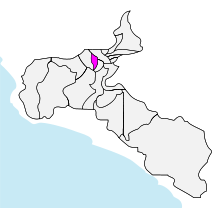
The canton was one of the earliest established in the country, in December 7, 1848.[4] As the metropolitan area has expanded Escazú has become a suburban area on the west side of the national capital city of San José. It is delineated by the Río Tiribí on its northern border. The peak of Cerro Cedral in the Cerros de Escazú marks the southern limit of the canton.
The canton's urban areas are home to 79.8% of its population. Children under the age of 10 account for 17.88% of the population, while 6.05% are over 65.
According to a 2012 United Nations Development Programme, Escazú ranks as the 4th highest canton in Costa Rica in so far as human development.[5]
Districts
The canton of Escazú is subdivided into three districts (distritos):[6]
Escazú
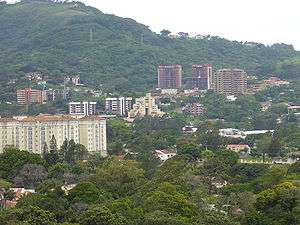
Escazú, officially San Miguel de Escazú, is the capital city of the canton of Escazú in the province of San José in Costa Rica. It is also the name of the district that includes the city, a subnational entity with 14,815 inhabitants.
The area is inhabited primarily by upper-mid to high income families, and known in the Costa Rican collective consciousness as home to the country's economic elite. Escazu is the wealthiest and most prominent city in the country catering to wealthy Americans and Europeans as well as wealthy locals. The city lies at an elevation of 1,088 meters above sea level on the northeast slopes of the Cerros de Escazú, 9 kilometers west of the national capital city of San José. The climate is mostly tropical: it is not unknown for Escazú to experience rainfall on a day in which San José is dry and sunny. November and December frequently bring high winds.
San Miguel District (Also known as simply Escazú District or Escazú Centro), is the first of three that make up the canton. It lies in the center of this municipality, limiting west to Santa Ana Canton, north to San Rafael district and south to San Antonio district.[7]
The district has an area of 4.38 km² and a population of 14,815 inhabitants by June 30, 2008 (3,382.42 inhabitants per km²).[8]
Escazú is one of the most affluent places in Costa Rica, with many expensive restaurants and shops, and has some of the most exclusive shopping and dining venues in the country. It has new developments, like Avenida Escazú, which holds the country's first IMAX theater. Avenida Escazú is a modern outdoor mall/center. This mall has many international brands like Max Mara, Women's Secret, Cortefiel, and Adolfo Dominguez, the country's first Starbucks, and a campus of Texas Tech University. Another unique feature of Escazu is that it is home to one of the most luxurious malls in Costa Rica, Multiplaza Escazu, with stores from large international brand names like Zara, Armani Exchange, MNG, Guess, Lacoste, Tiffany and Co., Carolina Herrera, Salvatore Ferragamo, among others. Many locations in the city are prized for their scenic outlooks. This zone is one of the most developed parts in the metropolitan area, populated by families with high incomes. Escazú contains many apartment blocks and residential areas.
Over the past couple of decades, Escazú has become an expatriate enclave: several embassies have their residences located here, including the residence of the US Ambassador, Dutch, British, German, Canadian, and South Korean Ambassadors. The past few years have seen a significant influx of newly arrived foreigners from North America, South America and Europe. It is home to many bars and restaurants, especially those of the more chic (and expensive) variety. Rents and prices reflect this and Escazú is one of the most well-known upscale locations in Costa Rica. The city offers many venues that are English speaking oriented like movie theaters, health clinics, business centers and a luxury country club.
The football soccer club Brujas F.C. was born here. The name of the team "Brujas" is a reference to the nickname of the city "La ciudad de las brujas" (The City of the Witches). However, the team moved in 2009 to Desamparados.
San Antonio
San Antonio is one of the higher towns in the city. It has a traditional church with a square and football field in the center surrounded by the majority of its local shops and businesses.
San Rafael
History
Escazú was first mentioned as a canton in a decree dated December 7, 1848.
The name "Escazú" derives from the indigenous word "Izt-kat-zu", which means "resting stone". The story tells of Indians traveling from Aserri (south of San Jose) to Pacaca (near Ciudad Colon), who used to stop and rest at this location, which was about halfway between the two villages. The first inhabitants were natives from the Guetaras or Huaca tribes. By 1755, villagers were ordered out of Escazú and moved to San José by force. From 1796 to 1799 the church of San Miguel was built with the cooperation of the people that had already re-established at this site. By 1801 the population of Escazú reached 1,325. On May 28, 1920, the government of Costa Rica granted Escazú the status of City, head of the Canton (County) of Escazú.
Popular legend tags Escazú as La Ciudad de las Brujas (the City of the Witches), leading to its municipal seal, a depiction of a witch on a broomstick flying over the surrounding mountains.
Landmarks
Local landmarks in the canton include the Costa Rica Country Club, the Multi Plaza Mall, and more recently, Avenida Escazú. These new complexes hold some of the world's most luxurious brands in Multiplaza Mall. Escazú is also home to several diplomatic missions, including the residence of the Ambassador from the United States.
References
- "Resultados generales Censo Nacional de Población y Vivienda 2011" (PDF). Instituto Nacional de Estadística y Censos. Retrieved February 11, 2014.
- Estimate of Instituto Nacional de Estadística y Censos (INEC), June 30, 2008.
- "Archived copy" (PDF). Archived from the original (PDF) on March 4, 2016. Retrieved December 20, 2015.CS1 maint: archived copy as title (link)
- "Municipalidad de Escazú, Costa Rica – Reseña Histórica". escazu.go.cr. Retrieved December 20, 2015.
- "Atlas del Desarrollo Humano Cantonal de Costa Rica 2012 | PNUD- UCR". www.pnud.or.cr. Archived from the original on March 5, 2016. Retrieved December 20, 2015.
- "División Territorial Administrativa de Costa Rica" (PDF) (in Spanish). Instituto de Fomento y Asesoria Municipal (IFAM). May 5, 2009. Archived from the original (PDF) on August 2, 2015.
- Mapa Cantonal del Censo de 1984, published by the National Institute of Statistics and Census(INEC) and updated by the Central American Population Center (CCP)
- Población Total Cerrada por Sexo, según Provincia, Cantón y Distrito, published by the National Institute of Statistics and Census(INEC)